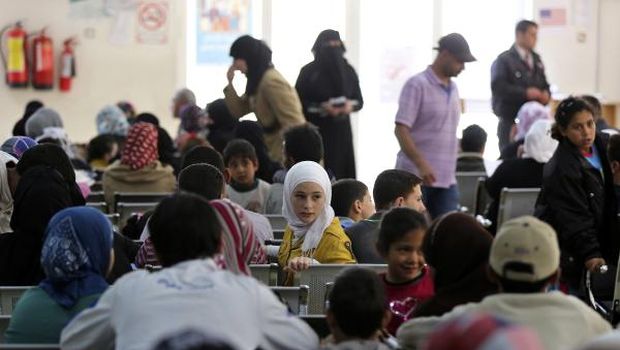
Syrian refugees register their names at the UNHCR office in Amman, Jordan on April 21, 2014. (Reuters/Muhammad Hamed/Pool)
Amman, Asharq Al-Awsat—The speaker of the Jordanian parliament opposed calls from MPs to close the country’s border to Syrian refugees on Monday, but called for stricter controls on crossing points to protect national security.
Speaking to Asharq Al-Awsat, the speaker, Atef Tarawneh, said: “Jordan is a state which respects the law and international charters which prohibit the closure of borders to peaceful civilians.” However, he also called for closer regulation of the process of entry and the respect for Jordanian laws.
Tarawneh’s comments followed a parliamentary memo, signed by 24 Jordanian MPs, calling on the government to close the borders to the flood of refugees from Syria.
The Jordanian government estimates there are now over 1.2 million Syrians living in Jordan, alongside around 6.5 million Jordanians.
The speaker acknowledged the burden of the refugees on Jordan, saying they had “become a burden on the budget and affected the infrastructure of the country.”
Tarawneh also said economic aid from Gulf states had helped Jordan cope with the crisis caused by the conflict in neighboring Syria.
He said: “In these economic circumstances in the Hashemite Kingdom of Jordan, and the flood of Syrian refugees, I would like to offer my thanks to the member states of the Gulf Cooperation Council, especially the Kingdom of Saudi Arabia, the UAE and Kuwait, for the financial support which they have provided and continue to provide to Jordan, to help it confront these difficult circumstances.”
The speaker claimed that the Jordanian parliament, elected in January 2013, was functioning smoothly despite the disagreements over refugees and the continuing spillover from the conflict in Syria, and the uncertainty over the future of talks between Israel and the Palestinians.
He said: “There are some issues related to the region which the parliament pays as much attention to as the government does, especially the Palestinian and Syrian issues. The parliament has the right to follow these issues in detail, and that is why we always ask the government about them. From my personal point of view, I think the government is meeting its obligations in dealing with the issues of the region, but at the same time, I also respect the views of my colleagues who disagree with the government.”
Tarawneh denied that recent amendments to parliamentary procedure were designed to “gag MPs.”
He said: “The amendments to our rules of procedure aim to activate the roles of the parliament’s committees to be the main maker of laws, where all legislation is discussed in detail. But MPs can also provide their suggestions in writing to the presidency of the parliament to discuss them. The old process of discussing new proposals instantly is in the past.”
“The regulatory role of the parliament is preserved and will not nullify the right of the MP to make interventions inside the chamber,” he added.
